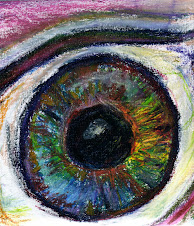It has been about six years since Dr. Doell recruited me to become a vision therapist in her optometry practice. At the time, I was a classroom teacher with a master's degree and I was also her patient - we had met when one of my own children suffered from a convergence insufficiency close to 20 years ago. She did about six weeks of vision therapy on Nancy and treated the whole family happily ever after.
We clicked - come from the same area of New York City and find the same things funny so we laughed through each appointment and even went out to lunch for fun a time or two. So, when she told me she was looking for people with masters degrees in education or OT to train herself, I was interested - besides single parenting (not by design) six minor children on a teacher salary was not cutting it so the few extra bucks looked good.
I observed the VT room in action and started working after school a couple of evenings each week. I already knew how to read a child's personality and make them feel at ease. It was easy for me to set up an activity and make it meaningful but it took a lot of practice to learn how to observe the eyes at work, how to match the right therapeutic activity to the diagnoses, how to decode the medical notes in the patient's file, and how to record and then apply what I observed.
Reading optometry books and articles made me feel illiterate at first - a whole new vocabulary had to be grasped - and I felt really slow at the task in spite of being an insatiable very competent reader. But I persevered, attended workshops and optometry conferences and asked the same questions a million different ways not realizing that it was the same question sometimes.
Now I find myself watching the eyes of people being interviewed on television and wondering if there is a strabismus or some other problem to explain anything other than aligned normal looking eye contact or eye movements. I find myself wishing I could do some simple activities with random colleagues and relatives because they display familiar ocular behaviors or postures that I know I could perhaps address and provide the means to greater visual efficiency.
I wish I could interest every classroom teacher in my e-books because a few carefully chosen lessons using the activities I present might just make a few more kids into more adequate readers who could do better on the dreaded standardized tests. Why don't the graduate level reading classes incorporate basic visual efficiencies or present the list of classroom behaviors that signal probable learning-related vision challenges which proper optometric attention could resolve?
I don't know how many more years I will be doing vision therapy a couple of days each week but I do know that my life and outlook has been forever changed because I have been introduced to the profession.
Tuesday, January 19, 2010
Subscribe to:
Post Comments (Atom)





1 comment:
Hi Lesley,
Thank you for sharing your vision therapy journey. I am also a teacher turned therapist who is shocked with the lack of understanding in the education world and the degree to which they refuse to hear.
Post a Comment